

E-Books → Correspondence 1919-1973 (New Heidegger Research)
Published by: voska89 on 7-04-2023, 05:31 |  0
0
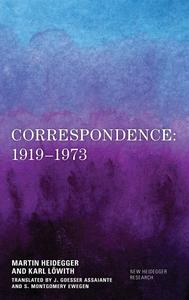
Free Download Correspondence: 1919-1973 (New Heidegger Research) by Martin Heidegger, Karl Löwith, translated by S. Montgomery Ewegen, J. Goesser Assaiante
English | November 4, 2021 | ISBN: 1786607220 | True EPUB | 334 pages | 8 MB
This volume consists of over one-hundred epistolary exchanges between Martin Heidegger and one of his earliest students, Karl Löwith, who became a renowned and accomplished philosopher in his own right. The letters span a period of just over fifty years and range from casual to philosophical in tone. The more philosophically oriented letters shed important light on the ideas and writings of both Heidegger and Löwith, while the more casual letters provide insight into Heidegger the teacher, the man, and the friend, as well as into Löwith the devoted but reflectively critical student.
E-Books → The Phenomenological Quest between Avicenna and Heidegger
Published by: voska89 on 1-03-2023, 00:21 |  0
0
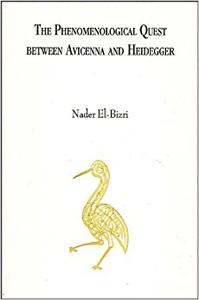
Free Download Nader El-Bizri, "The Phenomenological Quest between Avicenna and Heidegger"
English | 2000 | ISBN: 1586840053 | PDF | pages: 332 | 38.5 mb
Examines Avicenna's phenomenological considerations of the question of being.
E-Books → Being Towards Death Heidegger and the Orthodox Theology of the East
Published by: voska89 on 16-02-2023, 01:33 |  0
0
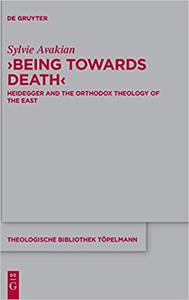
Sylvie Avakian, "Being Towards Death: Heidegger and the Orthodox Theology of the East "
English | ISBN: 3110705338 | 2021 | 350 pages | EPUB | 2 MB
Das Werk stellt den philosophischen Beitrag Martin Heideggers im Zusammenhang mit dem theologischen Beitrag des Ostens, besonders dem Nikolai Berdyaevs, dar. Damit bringt es die westliche Welt mit der östlichen, die Philosophie mit der Theologie ins Gespräch und ist ein Versuch der christlichen Theologie eine existentielle Sprache zu bieten, die für die Gegenwart von Bedeutung ist. Des Weiteren ist das "Sein zum Tode" mit dem Sein zu den Anderen bzw. zu Gott vergleichbar, durch welche das Sein-zum-wahren-freien-Selbst zu erreichen ist. In diesem Sinne zielt das Werk darauf ab, das "Sein zum Tode" durch die Sprache zum Ausdruck zu bringen. Damit ist das Werk auch ein Übergang von allgemein akzeptierten Formulierungen und überkommenen Weisen Theologie zu treiben hin zur philosophischen Reflexion über den Glauben. An vielen Stellen ruft es aber auch jene tiefgründigen Beiträge des menschlichen Denkens aus der Vergangenheit ab, die hauptsächlich von den anthropologischen Aspekten der Theologie ausgehen. Denn auch wenn die göttliche Gabe jeglicher menschlichen Erwiderung vorausgeht sind alle Ausdrücke dieser Gabe und der Erwiderungen darauf menschliche Ausdrücke, die aus Menschen entstehen und für Menschen formuliert sind.
E-Books → The Eclipse of Humanity Heschel's Critique of Heidegger (Studia Judaica)
Published by: voska89 on 11-02-2023, 05:28 |  0
0
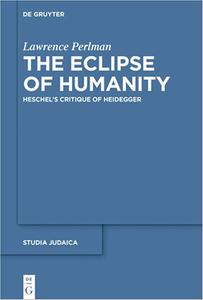
Lawrence Perlman, "The Eclipse of Humanity: Heschel's Critique of Heidegger (Studia Judaica) "
English | ISBN: 3110441888 | 2016 | 216 pages | EPUB | 4 MB
It has been widely assumed that Heschel's writings are poetic inspirations devoid of philosophical analysis and unresponsive to the evil of the Holocaust. Who Is Man? (1965) contains a detailed phenomenological analyis of man and being which is directed at the main work of Martin Heidegger found primarily in Being and Time (1927) and Letter on Humanism (1946). When the analysis of Who Is Man? is unapacked in the light of these associations it is clear that Heschel rejected poetry and metaphor as a means of theological elucidation, that he offered a profound examination of the Holocaust and that the major thrust of his thinking eschews Heidegerrian deconstruction and the postmodernism that ensued in its phenomenological wake. Who Is Man? contains direct and indirect criticisms of Heidegger's notions of 'Dasein', 'thrownness', 'facticity' and 'submission' to name a few essential Heideggerian concepts. In using his ontological connective method in opposition to Heidegger's 'ontological difference', Heschel makes the argument that the biblical notion of Adam as a being open to transcendence stands in oppostion to the philosophical tradition from Parmenides to Heidegger and is the only basis for a redemptive view of humanity.
E-Books → Heidegger and his Anglo-American Reception A Comprehensive Approach
Published by: voska89 on 28-01-2023, 05:21 |  0
0
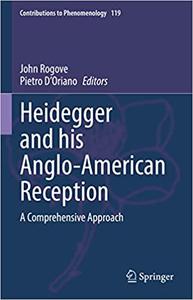
John Rogove, "Heidegger and his Anglo-American Reception: A Comprehensive Approach "
English | ISBN: 303105816X | 2022 | 420 pages | PDF | 5 MB
This book presents both a historical overview of the absorption of Heidegger's thought into English-language philosophical schools as well as a philosophical discussion of his thought provided by contemporary scholars. The text describes the ways in which a philosophical methodology and worldview seemingly so inhospitable to Anglophone academia has managed to find an unlikely home.
E-Books → Heidegger's Shadow Kant, Husserl, and the Transcendental Turn
Published by: voska89 on 5-01-2023, 09:47 |  0
0
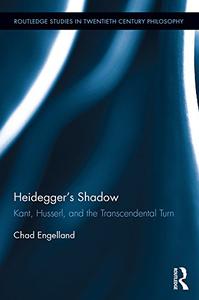
Chad Engelland, "Heidegger's Shadow: Kant, Husserl, and the Transcendental Turn"
English | 2017 | ISBN: 1138181870 | EPUB | pages: 290 | 1.9 mb
Heidegger's Shadow is an important contribution to the understanding of Heidegger's ambivalent relation to transcendental philosophy. Its contention is that Heidegger recognizes the importance of transcendental philosophy as the necessary point of entry to his thought, but he nonetheless comes to regard it as something that he must strive to overcome even though he knows such an attempt can never succeed. Engelland thoroughly engages with major texts such as Kant and the Problem of Metaphysics, Being and Time, and Contributions and traces the progression of Heidegger's readings of Kant and Husserl to show that Heidegger cannot abandon his own earlier breakthrough work in transcendental philosophy. This book will be of interest to those working on phenomenology, continental philosophy, and transcendental philosophy.
E-Books → Heidegger and the Work of Art History
Published by: voska89 on 5-01-2023, 09:47 |  0
0

Heidegger and the Work of Art History By Amanda Boetzkes (editor), Aron Vinegar (editor)
2014 | 374 Pages | ISBN: 1409456137 | PDF | 13 MB
Heidegger and the Work of Art History explores the impact and future possibilities of Heidegger's philosophy for art history and visual culture in the twenty-first century. Scholars from the fields of art history, visual and material studies, design, philosophy, aesthetics and new media pursue diverse lines of thinking that have departed from Heidegger's work in order to foster compelling new accounts of works of art and their historicity. This collected book of essays also shows how studies in the history and theory of the visual enrich our understanding of Heidegger's philosophy. In addition to examining the philosopher's lively collaborations with art historians, and how his longstanding engagement with the visual arts influenced his conceptualization of history, the essays in this volume consider the ontological and ethical implications of our encounters with works of art, the visual techniques that form worlds, how to think about 'things' beyond human-centred relationships, the moods, dispositions, and politics of art's history, and the terms by which we might rethink aesthetic judgment and the interpretation of the visible world, from the early modern period to the present day.
E-Books → Heidegger's Nietzsche Being and Becoming
Published by: voska89 on 26-12-2022, 10:16 |  0
0
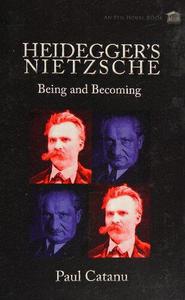
Heidegger's Nietzsche: Being and Becoming By Paul Catanu, Emery Moreira (editor)
2010 | 430 Pages | ISBN: 1926716027 | PDF | 19 MB
Hammering, bombastic, poetic, mystic Nietzsche as seen through the mind of the great ontologist Martin Heidegger is what Dr. Catanu delivers in this new volume. Nietzsche's thought dissected,critiqued and delimited by the author of "Being and Time" one of the most influential modern philosophers of our day, is explored in this insightful new volume, containing never before translated passages from the Nietzschean Nachlass. Heidegger's Nietzsche re-assesses Nietzsche's metaphysics of Becoming and extends Heidegger's line of thought into areas the ontologist neglected. Providing fresh insight into the minds of these two great Western thinkers, "Heidegger's Nietzsche: Being and Becoming" is a must read for today's discerning scholar and thinker. ". . . A product of impressive erudition and scholarship, this book takes a comprehensive survey of Nietzsche's texts on Becoming, and shows how that idea is entangled with all others central to his philosophy, including will to power, eternal recurrence, nihilism and the overman. The book evinces the author's acquaintance with an impressive amount of the secondary literature, on both the continental and the Anglo-American sides. It delves deeply into most of the relevant issues and throws helpful light in many places." - John Richardson, Professor of Philosophy, New York University
E-Books → Heidegger's Ontology of Events
Published by: voska89 on 22-12-2022, 15:19 |  0
0
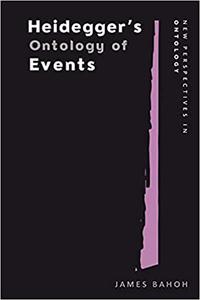
James Bahoh, "Heidegger's Ontology of Events "
English | ISBN: 1474443699 | 2021 | 240 pages | PDF | 751 KB
James Bahoh proposes a new methodology for explaining Heidegger's philosophy: diagenic analysis. This approach solves a set of interpretive problems that have stymied previous approaches to his difficult later work and led to substantial inconsistencies in the available scholarship. Using it, Bahoh reconstructs Heidegger's concept of event in relation to his theories of history, truth, difference, ground and time-space. In these contexts, Bahoh argues that Heidegger's logic of events entails a logic of difference that is prior to and constitutive for the logic of identity essential to traditional metaphysics. The logic of events explains the generation of ontological structures grounding individuated finite domains - that is, it explains the generation of the logic of worlds of beings.
E-Books → Beyond Nihilism The Turn in Heidegger's Thought from Nietzsche to Hölderlin
Published by: voska89 on 22-12-2022, 14:12 |  0
0
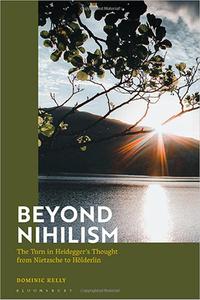
Dominic Kelly, "Beyond Nihilism: The Turn in Heidegger's Thought from Nietzsche to Hölderlin"
English | ISBN: 1350133752 | 2022 | 200 pages | PDF | 1309 KB
Martin Heidegger's (1889-1976) criticism of Friedrich Nietzsche's nihilism represented a 'turn' in his thought. In this new and perceptive book, Dominic Kelly explores nihilism through the work of two relatively modern and much studied philosophers; Heidegger and Nietzsche and shows how Heidegger began to think in a way that was not solely philosophical and instead used poetry to achieve a new relation to being. In doing so, Heidegger was able to move past Nietzsche's concepts and thus, nihilism itself. Through his exploration of Heidegger's journey to a form of thinking beyond the philosophical then, Kelly exposes nihilism's crucial place in Continental philosophy and has written a book that is essential for students and academics working in Heidegger studies. Kelly's engagement with Heidegger's more poetic philosophy also benefits students of metaphysics, the philosophy of art and aesthetics, and visual culture more widely. By putting nihilism into its historical context and examining its Ancient Greek origins, Kelly's book will also be of use to those studying early philosophical thought - a requirement for all philosophy courses - and provides a valuable account of nihilism's historical trajectory.



